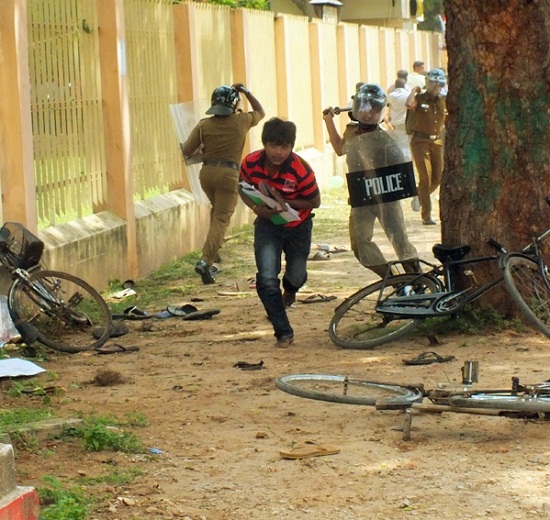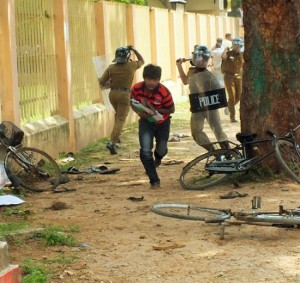Laksiri Fernando
November has been an eventful month, not very good omen for the Rajapaksa regime. First it was their rush for the impeachment against the Chief Justice, with much resistance emerging from the legal fraternity and the public. Then came the brutal killing of 27 inmates at the Welikada Prison; a blatant murder than anything else. The month ended by the military and the police desperately attacking the students at the University of Jaffna who were engaged in peaceful activities; revealing to the whole world that the minority Tamils are still under the military yoke.
The three human rights issues emerged were (1) the independence of the judiciary, (2) security of the persons under state custody and (3) the rights of minorities to dissent and protest peacefully.
Who can now believe that the military did not indulge in war crimes during the last stages of the war?
Grieving for the Dead
Maarveerar(in Tamil) or Mahaviru (in Sinhala) celebrations have been common events in Sri Lanka for the last three decades or so both in the South and in the North, commemorating different heroes of the LTTE and the JVP, however much they were misled ideologically or they misled the others on a destructive path. Only time and wise policies will sort out these matters, taking the young away from violent and destructive political causes.
By mere coincidence, both celebrations fall in the month of November. The JVP celebrated their heroes’ day on the 13thNovember in Colombo and in many other places (including Japan!). There were no army or police interventions. It is true that the LTTE, in contrast, is a proscribed organization in Sri Lanka and in many other countries. But their political party, the Peoples’ Front of Liberation Tigers (PFLT) was a registered organization until last year and the name was taken out from the registered list because of its failure to submit annual reports.
Maarveerar Day is not only about ‘heroes.’It is also about the dead and the deceased. It is a day of mourning and in the case of the Tamils in recent times there are thousands and thousands of innocent civilians who had to ‘sacrifice their lives’ to defeat the LTTE by the army. They were in fact killed because of inhuman military strategy. The Tamils cannot be blamed to consider the SL army as the Sinhala army. There is no other day of mourning left for them to grieve about their loved ones – fathers, mothers, husbands, wives, sisters and brothers and not to speak of other relatives or friends.
November is also the month of ‘all saints and all souls’ for the Christians and it was reported from Jaffna that the police and army secret services were poking their noses into church activities and sermons to see whether there were any semblance of moaning for the dead of the last stages of the war. Many Christian priests were extremely nervous of this poisoned atmosphere.
Maarveerar day this year, 27 November, also coincided with the Hindu Tamil celebration of Karthigai Deepam when the devotees light oil lamps to dispel three impurities of “egoism, selfish action and delusion.’ Particularly among the young, the ‘sisters supposed to pray for their brothers’ wellbeing and the brothers in turn promise to safeguard the sisters in times of trouble.” I am quoting from a reliable website. It is said that this is what was going on between the Ananda Kumaraswami women’s hostel and the Balasingham men’s hostel at the Jaffna University possibly also with a political overtone when the army intervened. There were undoubtedly oil lamps that were lit. The Lord Shiva is supposed to appear in the form of flame to dispel evil.
Events in the Campus
E Saravanapavan, a Member of Parliament (MP) of the Tamil National Alliance (TNA) for the Jaffna District has given an eyewitness report on some of the events of what happened at the Jaffna Campus on 27 and 28 November (dbsjeyaraj.com, 30 November 2012). There is no denial of the fact that there were efforts to commemorate the Maarveerar Day in Jaffna and particularly at the University. As he says, however, “It is customary for people to pay their respect to the deceased on such days. This salutation offered to their blood brothers, relations and parents has been mercilessly suppressed by the forces.” He particularly notes that throughout the previous week the army in civilian clothes has been operating in the Campus threatening the students against any activity.
On that particular day of 27thTuesday, the army has entered the campus in civilian clothes but equipped with arms and again threatened the students of any possible lighting of oil lamps. By the night fall they have cordoned off particularly two hostels and the police also had arrived. They have locked the boys in the Balasingham hall and occupied the top floor. No student was allowed to go out. This is partly reminiscent of what happened in the Welikada Prison on the 9th of November. The information soon spread and MP Saravanapavan arrived at the scene.
As he says, “We travelled through Ramanathan Street and approached Ananda Kumarasamy hostel. We saw several army & police vehicles parked in front of this hostel in the railway street. .. At that time I noted the army personnel entering the Boys hostel and threatening the students. Immediately, I travelled through Brown Street and reached Balasingham hostel. I saw the campus security there along with two police offices. I got down from my vehicle and inquired as to what happened. Then they said they were not in a position to do anything.”
He further says, “At that time I saw a large number of army personnel running from the hostel towards the entrance with sticks and guns in hand and proceeded angrily to the Ladies Hostel. Then I too ran in the same direction and on my way I saw Jaffna HQI Sam Sigora standing there.” The MP says there were men in motor cycles their faces covered with masks.
If there had been any unlawful or suspicious activity, it was a matter for the police to handle but not the army. Apart from the police, there is campus security that could handle any disturbance and that was apparently not the case. There are no ‘Emergency Regulations’ operating in the country, at least not by law and therefore any army intervention in civilian matters is illegal and arbitrary. What is apparent in particularly Jaffna is undeclared army rule without any law to govern the army behaviour.
Student Protests
The following day on the 28ththere had been student protests against the previous day incidents. There were reports that women undergraduates were threatened with guns and they were insulted. The students were requesting explanations from the university authorities. The MP relates the following:
“In fact the students, wearing pieces of black fabric around their mouths and holding slogans were sitting very peacefully at the University entrance. They condemned the army for their mean act of breaking the Girls hostel doors and entering it and demanded an explanation from the university authorities. Thereafter they proceeded in a peaceful march, from the Science faculty towards the University entrance, without disturbing the general traffic.”
It was at this point the riot police had attacked the student demonstrators on the orders of the Jaffna HQI. MP again reports that
“Followed by this attack, a large number of army personnel who were at the scene too started attacking the students with their guns and kicking with their boots. As a result, 07 students got severely injured and more than 10 got minor injuries. This includes the girl students and the media personnel who went to collect news.”
There had been altercations between the MP and the HQI when the MP tried to intervene on behalf of the arrested students. At least five were arrested and then released under intervention. It was during these altercations that the army officer had intervened and the MPs report says the following.
“At that point, an army officer standing close by insulted me very badly. I asked the HQI as to how and why army gets involved in a civil matter that should be dealt by the police and what right army officer has to question a Member of Parliament like me. Then, the army officer exploded in a threatening tone that he could show his power and whether to show it to me now.”
Although the MP was not physically attacked his official vehicle was attacked and all glasses were smashed. Even thereafter that particular army officer had threatened the MP. There are claims these days that the ‘Parliament is Supreme’ to mean even the members are also supreme. Perhaps this is only for the Sinhala ones but not for the Tamil MPs judging by the behaviour of the army and the police during the above incident. Perhaps the army is more supreme than even the Parliament or their MPs.
If a behaviour of an army officer was such during a so-called peace time and three and half years after the end of the war, one could imagine how they would have behaved during the last stages of the war.
Attack on the Uthayan Editor
Another human rights issue that surfaced during the events was the attack on the Uthayan Editor, T Thevanathan. He had gone to the scene to cover the story with his camera. This had taken place on the first day, the 27th and not the second day. As MP Saravanapavan reports the following was what had happened.
“Then I too ran in the same direction and on my way I saw Jaffna HQI Sam Sigora standing there. Then I saw an army officer hitting a person’s face by keeping him standing against a wall of a Hindu temple. Then, I went to the scene and shouted to stop hitting. When my bodyguard came and said in Sinhala that I am a Member of Parliament the officer stopped his blows. When the person who got the blows raised his head, I recognized him as the Editor of Uthayan newspaper. I understand that he was attacked for taking photographs of the activities of the army and also the lamps lighted in the Girls hostel.”
No further comment on the attack on the Uthayan Editor is necessary except to say that perhaps this heralds what to come again on the freedom of the media not only in the North but also in the South. The university students in the South have already started protesting against what happened at the Jaffna University on the 27th and 28thNovember. Similar protests are necessary to uphold the media freedom of the Uthayan Editor, T Thevanathan and in Jaffna in general.
The evolving events are alarming and perhaps indicate a major political calamity to come soon. It could be in the form of a ‘quasi-military rule headed by the Executive President’ sans an independent judiciary and a meek Parliament which could sanction anything of the ‘military-executive’ claiming to be a ‘supreme legislature.’ What might be crucial is the unity between the opposition forces in the North and the South. This is not to speak of unity within all opposition forces and parties which is so obviously important. I still believe that the move towards a quasi-military rule is not necessarily the strength but the weakness of the Rajapaksa regime. It is a weakness emerging from their complicity of war crimes at the last stages of the war. It is to cover up and to defend that they are leaning on the military more and more.
There is nothing wrong in adapting what Martin Niemoller said about how the Nazis spread their tentacles in suffocating democracy in Germany to suit Sri Lanka today.
They have come against the Judiciary,
They have killed the prisoners in Welikada,
They have attacked the students in Jaffna,
They will come against everyone very soon,
If we don’t stop them united.

